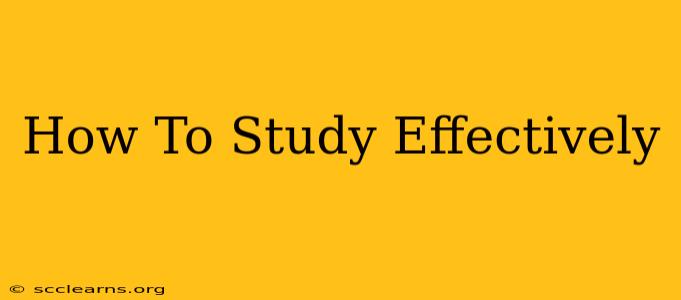Are you struggling to study effectively? Do you feel overwhelmed by the sheer volume of material you need to cover? Many students find studying a daunting task, but with the right strategies, you can transform your study sessions from frustrating struggles into productive and even enjoyable experiences. This comprehensive guide will equip you with proven techniques to optimize your study habits and achieve academic success.
Understand Your Learning Style
Before diving into specific study methods, it's crucial to understand how you learn best. Are you a visual learner, benefiting from diagrams and charts? Do you prefer auditory learning, like listening to lectures or recordings? Or are you a kinesthetic learner, who learns best through hands-on activities and movement? Identifying your learning style allows you to tailor your study methods for maximum effectiveness.
Different Learning Styles & Techniques:
- Visual Learners: Use flashcards, mind maps, diagrams, and color-coded notes.
- Auditory Learners: Record lectures, read aloud, discuss concepts with others, and use audio recordings of textbooks.
- Kinesthetic Learners: Use physical manipulatives, walk while reviewing material, and actively engage in hands-on activities related to your studies.
Create a Conducive Study Environment
Your study environment plays a significant role in your ability to focus and retain information. Minimize distractions by finding a quiet space free from interruptions. This could be a library, a dedicated study area at home, or even a quiet coffee shop.
Tips for an Ideal Study Environment:
- Minimize distractions: Turn off your phone, close unnecessary tabs on your computer, and let your family or roommates know you need uninterrupted time.
- Optimize lighting: Ensure adequate lighting to avoid eye strain.
- Comfortable seating: Choose a comfortable chair that supports good posture.
- Organized workspace: Keep your study area clean and organized to reduce mental clutter.
Effective Study Techniques
Once you've established a productive study environment, it's time to implement effective study techniques. These techniques are designed to enhance your comprehension and retention of information.
Active Recall: The Key to Retention
Instead of passively rereading notes, actively test yourself. This technique, known as active recall, forces your brain to retrieve information, strengthening memory and identifying knowledge gaps. Use flashcards, practice questions, or teach the material to someone else.
Spaced Repetition: Mastering the Material Over Time
Don't cram! Spaced repetition involves reviewing material at increasing intervals. This technique leverages the spacing effect, significantly improving long-term retention. Use apps like Anki or create your own spaced repetition schedule.
Interleaving: Mixing Subjects for Enhanced Learning
Instead of focusing on one subject for an extended period, interleave different subjects during your study sessions. This technique improves your ability to discriminate between concepts and boosts overall learning efficiency.
The Pomodoro Technique: Focused Study Sessions
The Pomodoro Technique involves working in focused bursts (typically 25 minutes) followed by short breaks (5 minutes). This technique combats mental fatigue and maintains concentration throughout your study sessions.
Beyond the Books: Supplement Your Studies
Don't limit your learning to textbooks and lectures. Explore additional resources to deepen your understanding and improve retention.
Utilize Supplementary Resources:
- Online Resources: Explore educational websites, online courses, and video lectures.
- Study Groups: Collaborate with peers to discuss concepts and reinforce learning.
- Seek Clarification: Don't hesitate to ask your professors or teaching assistants for help when you're struggling with specific concepts.
Prioritize Self-Care
Effective studying isn't just about hitting the books; it's also about taking care of your physical and mental well-being. Adequate sleep, regular exercise, and a healthy diet are crucial for optimal cognitive function and academic success.
Prioritizing Self-Care for Better Study Results:
- Get enough sleep: Aim for 7-9 hours of quality sleep per night.
- Eat nutritious meals: Fuel your brain with healthy foods.
- Exercise regularly: Physical activity improves focus and reduces stress.
- Take breaks: Avoid burnout by incorporating regular breaks into your study schedule.
By implementing these strategies, you can transform your study habits and unlock your academic potential. Remember that effective studying is a process, and finding what works best for you may take some experimentation. Be patient with yourself, stay consistent, and celebrate your progress along the way!

